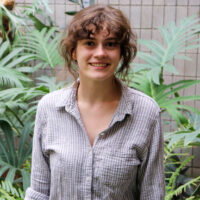
Examining Patterns of Dioicy Across Hornwort Phylogeny Using U/V Sex Chromosomes
Sexual reproduction is in every clade within eukaryotes and is essential to life on earth. However, little is known about how it evolved, the development of separate sexes, and what genes trigger this development. The hornworts, a lineage of bryophytes, is one of the deepest diverging clades in land plants. Recent studies have found that 40% of hornwort species are dioicous, with several independent transitions from monoicy to dioicy across the phylogeny. The genes responsible for this evolution are a mystery. To address this, this study compared genomes of male and female individuals from three species of three different families to determine whether similar genes are found in independently formed sex-determining regions. If certain genes have become sex-linked repeatedly, it would suggest these genes have a role in the evolution of dioicy in hornworts. The study began with DNA and RNA extraction for short-read Illumina sequencing of the three species’ genomes. After sequencing, genomes were assembled and aligned to their reference genomes, which led to preliminary data regarding the structure and location of the species sex chromosomes. The locations of the putative sex chromosomes, pseudoautosomal regions, and sex determining regions were found in Leiosporoceros and Phaeomegoceros. In Phymatoceros, the sex chromosome and the sex determining region has been theorized to be found as well. Genes were annotated using RNA data, and homologs to the reference sex were identified. These findings give a foundation for further research to examine whether similar genes are found in independently formed sex-determining regions.
This summer was incredibly valuable in honing my skills as a scientist. Under my mentor’s guidance, I was able to learn skills about troubleshooting difficult plant chemistry and bioinformatic problems while working with whole-genome level datasets. These skills are essential for scientists, and I feel as though I will come out of this summer a much better scientist than when I came in. I feel ready and inspired to go to graduate school and feel empowered to tackle much bigger scientific questions than I ever thought possible. This internship has set me up for a lifetime of learning and a trajectory of scientific curiosity.
